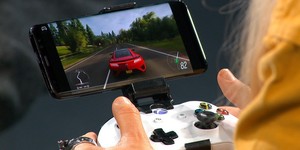Researchers show how gaming can improve eyesight
June 13, 2019 | 11:05
Companies: #university-of-lancaster

Researchers from Lancaster University's School of Computing and Communications claim that, contrary to what your parents may have told you as a child, playing computer games may actually improve a player's vision.
Few with an interest in gaming will have grown up without a parent or guardian telling them that they'll get square eyes, but according to research carried out at Lancaster University playing games may be the key to unlocking improved peripheral vision - but before you get too excited, the researchers are referring to a very specific type of game.
'Most computer games involve looking directly at targets, or following the movement of characters, because that is the most natural and intuitive way we use our eyes,' explains researcher Argenis Ramirez Gomez of the team's work. 'We wanted to explore the opposite - is it possible to play games just by using our peripheral vision, is it possible to develop strategies to overcome the challenge, would it be engaging and fun and could these games improve our peripheral awareness?'
The result was a trio of simple games, gathered in a suite called SuperVision, in which players use a mouse to select or steer objects using only their peripheral vision. Eye-tracking hardware is used to monitor the player's gaze, and if they look directly at the objects under their control they're penalised - including, in one game, having their character turned to stone by Medusa.
Players struggled at first as they attempted to control and resist their instinctive impulse to look,' explains Gomez. 'The games go against our natural behaviour. The players know they can't look but having to make decisions and interact with objects in the games forces players to lose control over their instincts and so they indulge their desire to look directly at the objects, failing in the game. But over time people developed strategies to overcome the challenge, such as focussing on a particular spot on the screen.
'We evaluated the participants' peripheral visual capabilities before and after the games to test for skills development. We found a significant improvement in object recognition in the participants' peripheral vision after playing the games.'
This improvement, the team claim, could be measured after just one gaming sessions; after the full two-week experiment, participants' peripheral vision skills continued to improve - and this gain appeared to persist even following a three-day break at the weekend during which the games were not played.
The team's work has been published in the journal Proceedings of the 2019 CHI Conference on Human Factors in Computing Systems.

MSI MPG Velox 100R Chassis Review
October 14 2021 | 15:04









Want to comment? Please log in.